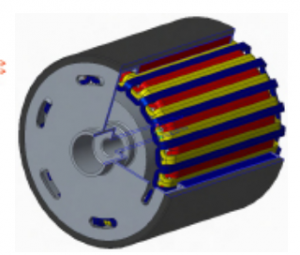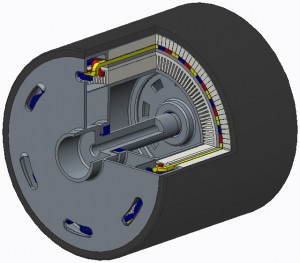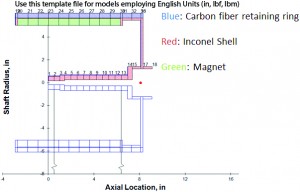Mechanical Design of High-Speed, High- Frequency Air-Core Machine
Mechanical Design of High-Speed, High- Frequency Air-Core Machine
Yuanshan Chen with adviser K. Haran
A high power density electric machine (8 hp/lb) with integrated high-frequency drives was proposed by Professor Kiruba Haran for the NASA Fixed Wing Project. It is an unconventional inside-out permanent magnet motor with an advanced composite rotor structure. The motor’s cantilever design requires extra consideration for its mechanical integrity. Our research utilizes Creo software to provide CAD models for prototype manufacturing and weight trade-off studies. Focusing on structural designs, simulations were run on ANSYS. These can be directly integrated with computational fluid dynamics and thermal studies in the future.
Figures 5 (a) and (b) give the baseline design as of June 30, 2015. A motor-sizing trade-off study was carried out to search for the optimized motor diameter and length and baseline specs. Weight, structural design and electromagnetics performance were considered. Continuing static structural studies from previous work, a dynamic analysis on the rotor was performed to verify the design in dynamic operation. Specifically, critical speed and unbalanced analyses were performed on rotor dynamics software, XLRotor. Different designs and bearing selections are shown in Fig. 6. The simulations in XLRotor provided faster results of the rotor performance than using finite element analysis. High-level design specifications were established for prototype bench tests.
This research is supported by NASA and the Grainger Center for Electric Machinery and Electromechanics.


